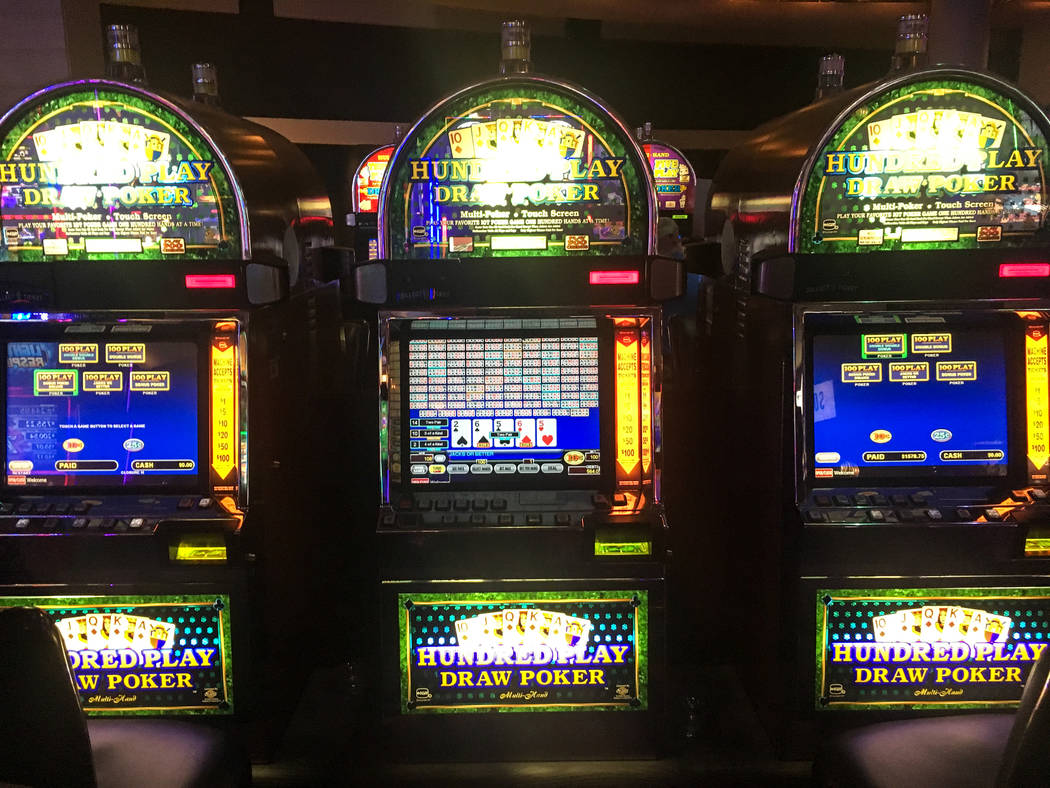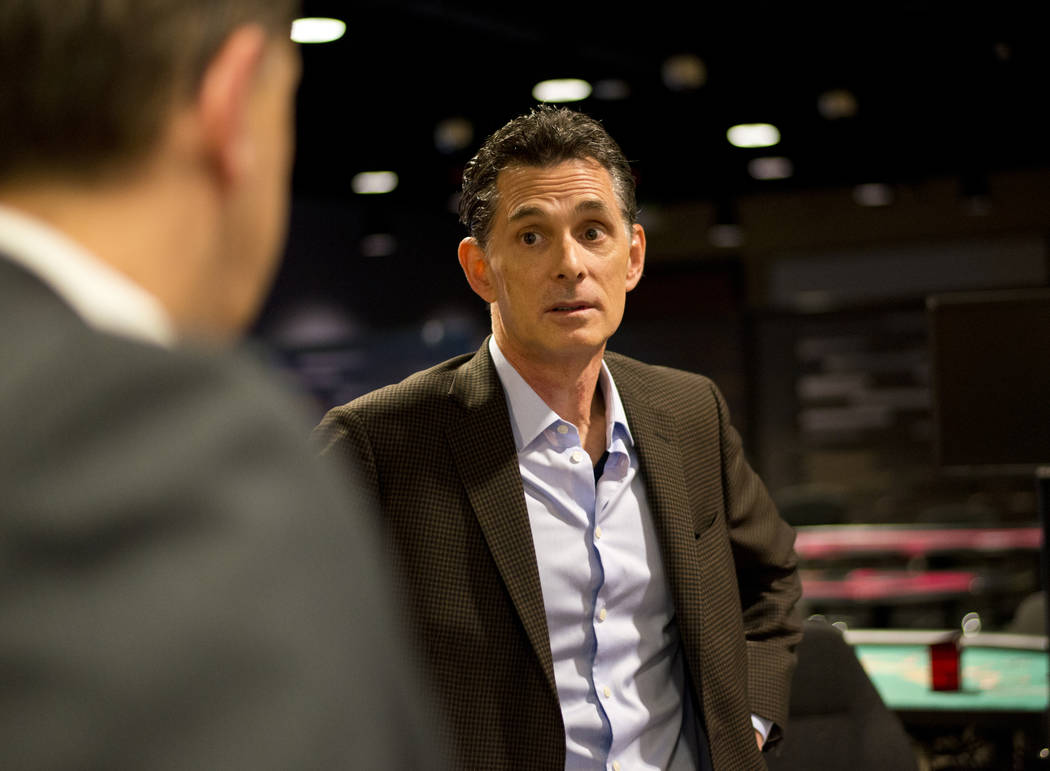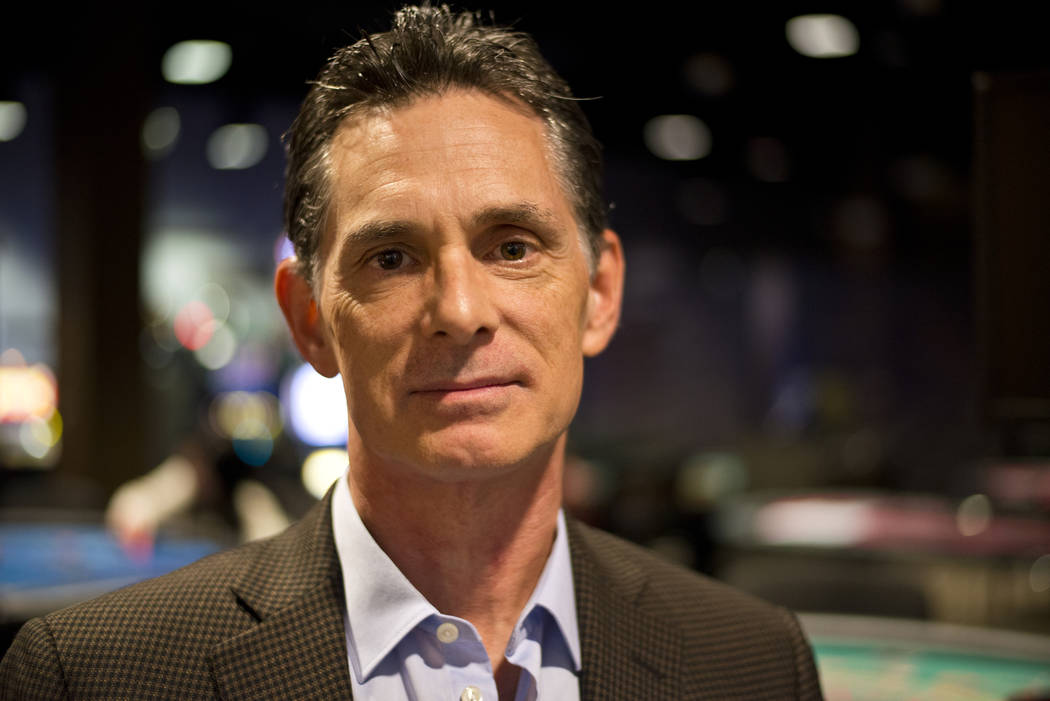Inside the Las Vegas shooter’s gambling world
Watching Jean Scott play video poker, it is easy to see how Mandalay Bay shooter Stephen Paddock could have burned through big money during his trips to Las Vegas.
Scott, the 78-year-old author of the “Frugal Gambler” book series, works the machine with both hands as she speeds through $125 wagers at an astonishing clip. Her fingers never leave the glowing buttons.
Her game of choice on this late October day is Hundred Play Draw Poker, a machine that allows her to play 100 hands of poker at a time. At her speed, Scott can play up to 700 hands of poker each minute.
In less than an hour, she puts $18,000 through the machine and is down about $1,000.
“You play at this level, you go down a thousand dollars, you go up a thousand dollars pretty fast,” Scott said.
As a longtime player like Scott, Paddock should have been used to this kind of volatility. But even the best video poker players can face epic losing streaks, which is what authorities have suggested happened to Paddock in the two years prior to the Oct. 1 shooting.
“He was pretty prolific, but he was going in the wrong direction,” Clark County Sheriff Joe Lombardo recently told KLAS-TV, implying financial losses might have motivated the killing spree. “Since September 2015, he’s lost a significant amount of wealth.”
Much of Paddock’s life appeared to revolve around his status as a high-limit gambler and the luxurious perks that came with it.
But Tony Lucas, a casino management professor at UNLV, said many players talk a better game than they play.
“It’s all about ego,” he said.
Elite tribe
Paddock remains a mystery more than a month after he killed 58 people from his suite at Mandalay Bay. But it’s clear that he took video poker seriously. He purchased Scott’s book “Tax Help for Gamblers,” and subscribed to the Las Vegas Advisor, a newsletter popular with high-rolling “advantage players” — gamblers with the skill and bankroll to turn the casino’s edge upside down by exploiting free hotel suites and other complimentary gifts.
In the weeks since the shooting, the tight-knit community of serious players has debated Paddock’s video poker skills. There’s general agreement that he inhabited their world.
“We were about the same level of player,” said David Walton, a professional poker player who recalls talking with Paddock a couple of times while playing video poker at Mandalay Bay and the Wynn Las Vegas. “We didn’t speak much – it’s not common really in that environment to continue talking because you’re focused on playing the machine. But I do recall a few words back and forth.”
Anthony Curtis, publisher of the Las Vegas Advisor and Scott’s books, said Paddock was a high roller with a winning record at some casinos, but a losing one at others, according to people who had seen his gaming records. Given his apparent skill and financial resources, there may be fewer than 100 players like Paddock in Las Vegas, gamblers say.
If that were the case, gamblers say casino hosts would have known him wherever he played, and he would have enjoyed considerable perks afforded to only an elite few.
Playing quarters
Advantage players gain their competitive edge by seeking out games with the best odds and playing them quickly, then cobbling together enough comps to offset their gambling losses. As a result, they’re highly sensitive to anything that could endanger their access to the best machines or casino promotions.
Scott, for example, agreed to let the Review-Journal shadow her and her husband to learn more about Paddock’s casino lifestyle. But she insisted that she be identified by her pen name and that the newspaper not disclose the name of the casino, for fear that other gamblers would start monopolizing the good machines.
Scott said she and her husband started out more than 30 years ago as low rollers, playing quarters. “I was always scared I was going to go broke,” she said. Their goal at the time was to break even and have fun.
But over the years, as they learned which games had better odds, their bankroll ballooned. Within a few years, they rose to high-roller status.
“If you had a hobby that you liked and you can make money off it, that would make it more fun,” Scott said.
Today, at the off-Strip casino where they do a lot of their gambling, the couple enjoy a $20,000 line of credit and membership in the highest tier of the player’s club.
But you’d never know it from the way they carry themselves. Dressed in a simple black outfit, Scott looks more like the Indiana high school English teacher she once was than a high roller who receives casino offers for free trips and cruises.
She and her husband walk onto the casino floor unnoticed, bypassing the high limit room for a set of three unremarkable-looking machines that she knows offer only the slightest edge to the house. There they will play for the next two hours, setting the game to “Turbo” so the hands are dealt faster.
Big fish
Paddock, a 64-year-old Mesquite resident and retired accountant, was not a “whale,” the term for the highest of high-rolling gamblers who receive virtually anything they want from casinos.
Curtis describes the difference like this: While Paddock might have played about $100,000 a trip, a whale may play seven hands of blackjack at one time, with $100,000 on each hand.
For players at that rarefied level, casinos will do just about anything: charter a jet to fly them in, hire a chef or a butler to staff their villa or organize fishing trips or excursions to the Super Bowl.
High rollers like Scott still get plenty of perks. “We’ve lived a luxurious, luxurious life because of the comps,” she said.
At her level, players receive free rooms or suites and free money just to come to the casino to play. There’s also high-end liquor, premium tickets to sporting events and shows and ski passes. All for free.
“I would never pay for food. That was like against my religion,” said Walton, the professional poker player who spoke with Paddock on occasion.
Walton said in his 12 years as a professional player in Las Vegas he often ate at gourmet restaurants for free, including Joel Robuchon at the MGM Grand and Wing Lei at the Wynn, where the Wagyu beef costs $320.
“I had really crazy dinners,” said Walton, who now lives in Florida. “I mean, I had a dinner for four people that was $4,000 one night at Mandalay Bay, and it was all comped by the casino.”
But Lucas, the UNLV professor, is skeptical that this style of play makes financial sense.
“You might earn $30 an hour,” he said. “If you had that kind of bankroll, you could find a much better way to use that money.”
Questions about scrutiny
Could Paddock’s status at Mandalay Bay have helped him escape scrutiny while plotting mass murder?
In the days before his attack on the Route 91 Harvest country music festival, Paddock brought to his 32nd-floor suite nearly a dozen bags containing about two dozen firearms, ammunition and bump stocks — devices that effectively convert semi-automatic rifles to fully automatic weapons. He set up cameras inside the suite and in the hallway outside his room.
“A high roller can get away with a lot,” Curtis said. “Sure, everything he was able to accomplish was made easier by him being a VIP customer.”
Scott also said she would not be surprised if Paddock was growing frustrated with the casinos for scaling back comps to players at his level. Since the recession, she said, casinos have become stingier.
“We’re all complaining about that,” Scott said. “You can still get a free room and once in a while a suite, but it’s like pulling teeth.”
Lombardo said Paddock was a narcissist who “was status-driven” and “was going through some bouts of depression.” The Review-Journal first reported last month that Paddock had been prescribed anti-anxiety medication in June.
Perfect play
Of all the casino games, video poker offers some of the best odds.
Blackjack and craps can have house edges as low as 1 or 1.5 percent depending on the casino’s rules and the skill of the player. The best Roulette games have house edges closer to 3 percent. But some video poker machines will give the player a slight edge over the house if the gambler plays perfectly.
However, exploiting that edge requires gamblers to employ perfect strategy, which takes skill and a lot of practice. The result: Most players lose more money than the odds suggest they should.
“Most people play horrible,” Walton said.
Software allows gamblers to improve their skills. These programs teach players when to hold face cards or pairs. Like many players, Paddock purchased a video poker tutorial from Curtis’ company.
“If he practiced with it, he was a good player,” Curtis said.
Scott has used them too, but perfect play does not prevent losing streaks, and back at the casino she was embroiled in one. After about another hour of play, the couple’s losses had jumped from $1,000 to $3,000.
Ever so briefly, she paused and said they would quit when they lost $5,000.
Then, almost on cue, she started winning. In less than 15 minutes, Scott made up the $3,000 and more, prompting her to exclaim: “We just got to even. We’re quitting!”
In just over two hours, she and her husband had put more than $75,000 through the machines and won about $500. Plus, with the points they had racked up on their player’s card, she figured they had earned about $500 in cash back as well.
For an advantage player, that’s a win.
Contact Brian Joseph at bjoseph@reviewjournal.com or 702-387-5208. Follow @bjoseph1 on Twitter. Contact Arthur Kane at akane@reviewjournal.com. Follow @ArthurMKane on Twitter.





























